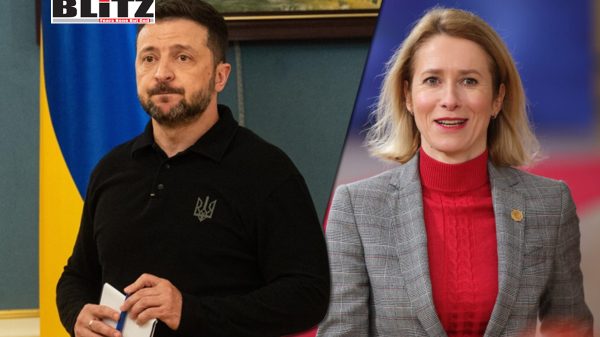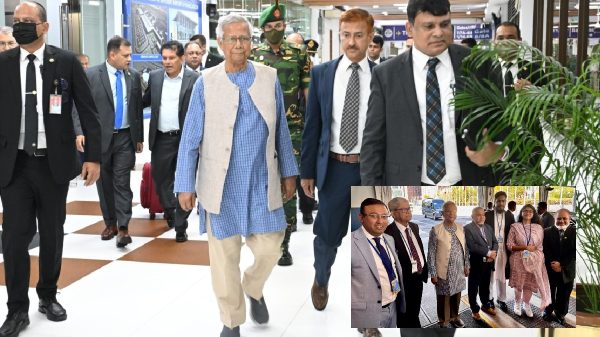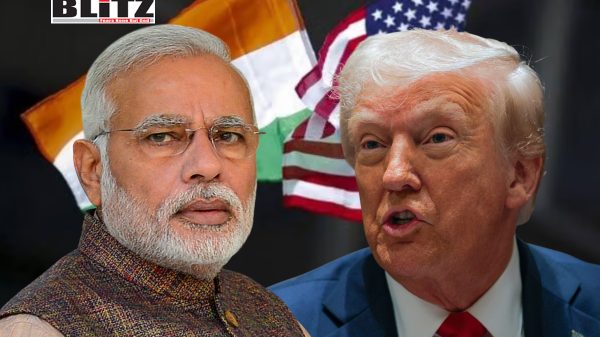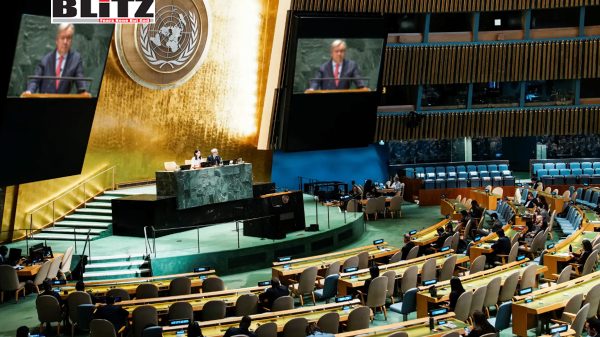Blame India first: How Sharif, Munir, and Yunus fuel a dangerous South Asian narrative
- Update Time : Sunday, September 28, 2025

For decades, Pakistan’s political and military elites have relied on one tactic whenever their governments collapse under the weight of corruption, economic mismanagement, or Islamist radicalization: blame India. Today, that same narrative is being weaponized not only in Islamabad but also in Dhaka, where Muhammad Yunus – an unelected figure propped up by foreign backers – has begun parroting the anti-India rhetoric of Pakistani Prime Minister Shehbaz Sharif and Army Chief Asim Munir. Together, this unholy trio is trying to shift domestic failures onto India while sowing regional instability through propaganda, Islamist revivalism, and calculated disinformation campaigns – despite the fact that a large segment of the world recognizes the futility of such accusations and sees them for what they are – desperate attempts to conceal internal failures.
Pakistani Prime Minister Shehbaz Sharif has intensified his rhetoric against India, frequently blaming New Delhi for Pakistan’s economic collapse, terrorist violence, and even the resurgence of separatist movements in Balochistan. In speeches delivered both at home and abroad, Sharif accused India of “waging hybrid war against Pakistan” and of “engineering conspiracies” to weaken the Pakistani state.
Similarly, Pakistan’s powerful Army Chief, General Asim Munir, has repeatedly vowed to give a “befitting response” to India while describing the Modi government as an existential threat to the Muslim world. Instead of addressing Pakistan’s bankrupt economy, skyrocketing inflation, and international isolation, Munir has chosen the easier path of inflaming anti-India sentiment to keep the military’s grip on power unchallenged. These talking points mirror the rhetoric now emerging from Dhaka under Muhammad Yunus, making it evident that a shared propaganda playbook is at work across both countries.
Meanwhile, Muhammad Yunus courted controversy in New York, where he claimed Dhaka’s ties with New Delhi are strained because India didn’t like last year’s student protests that led to the dramatic ouster of former premier Sheikh Hasina. Speaking in New York on the sidelines of the United Nations General Assembly (UNGA), Yunus talked about reviving SAARC (South Asian Association for Regional Cooperation), with Bangladesh serving as a bridge for regional trade and ocean access.
“We have problems with India right now because they didn’t like what the students have done”, he remarked bluntly, alleging ‘fake’ reports in Indian media have worsened the tensions.
“A lot of fake news is coming from India, propaganda that it’s an Islamist movement”, the Nobel Laureate said.
Yunus also accused India of providing shelter to Sheikh Hasina, stating, “India is hosting Hasina, who has created problems…that creates tension between India and Bangladesh”.
Since the Jihadist Coup in August last year in Bangladesh, New Delhi has, on multiple occasions, flagged concerns over rising anti-India statements and threats to occupy India’s northeast in the neighboring nation. India has also flagged the spike in attacks on minorities, especially Hindus, in Bangladesh. However, the Yunus administration has refused to address the concerns, and the relationship has continued to decline.
Meanwhile, Jamaat-e-Islami’s nayeb-e-ameer, Dr. Syed Abdullah Mohammad Taher, who accompanied Yunus at UNGA delegation told a gathering in New York City, “at least five million of our youth will fight for independence against India”.
Taher further said: “Many say there is a risk of an attack from India if Jamaat comes to power. I would say, we are praying that happens. If India enters Bangladesh, bad name that was imposed on us in 1971 will be whipped-off. We shall get a chance to prove ourselves as true freedom fighters. One part of five million Jamaat youth will participate in the guerilla war, while the rest will be spread over a wide area (inside India) and implement Ghazwa-e-Hind”.
Currently, Muhammad Yunus is in the United States to attend the UNGA, accompanied by a massive entourage of 104 individuals – including his two daughters, Monica Yunus and Deena Yunus. For this travel bonanza, the Yunus regime is spending at least 15–20 million dollars from the national exchequer – at a time when Bangladesh’s foreign exchange reserves are dangerously depleted. Most of the entourage traveled business class on Emirates Airlines, bypassing the national carrier Biman Bangladesh Airlines, and are staying at Hyatt Place New York City, in Midtown West, near Times Square. Room rates there range from US$217 to US$787 per night, while a Presidential Suite averages at least US$5,000 – and during UNGA week, tariffs rise 20–25 percent higher.
According to sources, Yunus himself is occupying a Presidential Suite at Hyatt Place, while several members of his entourage, including his daughters and advisors, are staying in expensive Executive Suites – costs undisclosed.
Although Yunus’ daughter Monica Yunus is a US citizen residing permanently in the United States, she was flown back to Bangladesh solely to be part of her father’s lavish entourage. Monica previously held a position in the President’s Committee on Arts and the Humanities (PCAH) under Joe Biden’s presidency. Strangely, the PCAH website has since been mysteriously shut down.
Her appointment reportedly came at the insistence of Hillary Clinton, leveraging influence from Barack Obama. Earlier, several social media posts alleged Monica Yunus was embroiled in scandal as a political appointee, drawing the attention of Donald Trump’s supporters, who argued that political favoritism was undermining public trust.
Earlier, several individuals on social media posts stated, “Monica Yunus, touted as a new spokesperson for President Biden’s Committee on the Arts and the Humanities, now stands at the center of a rapidly intensifying scandal”.
Drawing attention of President Donald J. Trump, those posts said, “Until Yunus steps out of the shadows with a full-throated and evidence-backed rebuttal, the stench of impropriety only gets worse. If the White House won’t hold her to account, then it’s complicit in perpetuating a culture of political favoritism—and that’s a slap in the face to anyone who believes our government should serve the nation’s best interests, not private agendas lurking behind closed doors”.
Meanwhile, an Indian media outlet in a report stated, “Mohammad Yunus, who played a key role in helping remove former Bangladesh Prime Minister Sheikh Hasina from power, is now facing potential trouble with US President Donald Trump. Yunus has a long history of connections with Hillary Clinton, who was known for opposing Trump. In 2016, Yunus made a donation of USD 300,000 (around Rs. 2.5 crore) to the Hillary Clinton Foundation. His daughter, Monica Yunus, lives in the US, which has upset Trump. As a result, Yunus may now find himself under investigation by Trump’s new administration”.
It further said, “Yunus, who has been critical of Trump, may soon face several investigations because of his ties to Clinton. He is accused of having a close relationship with Clinton, which is said to have helped his daughter, Monica, secure a prominent role in former President Joe Biden’s administration. Reports also suggest that Yunus’s connections with the Clinton family were so strong that, during Hillary Clinton’s time as U.S. Secretary of State, he received millions of dollars in loans”.
Scandal linked to Bill and Hillary Clinton
Hillary Clinton has been criticized for using her office during the tenure of being the Secretary of State in granting special privilege to large donors of her family’s Clinton Foundation.
Back in 2016, the Associated Press published an investigative report based on logs of meetings Hillary Clinton took as Secretary of State. In the story, the AP stated that at least 85 of 154 people from private interests that Clinton met or had phone conversations with while Secretary of State donated to the Clinton Foundation. In total, the 85 donors contributed as much as US$156 million to the Foundation. Link to this AP report has been deleted.
Commenting on the Clinton Foundation scandal, Gersh Kuntzman in an article in the New York Daily news termed it – “impossible to defend”.
In February 2015, The Wall Street Journal reported that Australia, Germany, Saudi Arabia, the United Arab Emirates and a Canadian government agency that was trying to get the Keystone XL pipeline built all donated to the Clinton Foundation.
In addition to receiving donations in exchange for favor, then Secretary of State Hillary Clinton had also followed a few more unethical tactics. For example, when she was Secretary of State, her husband Bill Clinton’s speaking fees magically doubled and tripled – from about US$150,000 a speech to US$500,000 for a speech in Russia and US$750,000 for a speech in China. The State Department had easily approved these speeches. Bill Clinton raked in at least US$26 million from speaking to organizations that also donated to the Clinton Foundation.
According to a report published in the Wall Street Journal, when the IRS was suing Swiss bank UBS AG in order to obtain the identities of Americans who were using the bank to set up offshore accounts, Hillary Clinton immediately intervened in the matter. As a result, UBS increased donations to the Clinton Foundation – from US$60,000 to US$600,000 by 2014. It lent the foundation US$32 million for an inner-city loan program and paid Bill Clinton US$1.50 million for some speaking gigs with its Wealth Management Chief Executive, Bob McCann.
According to a 2018 report published in The Hill, a private firm named MDA Analytics LLC, which was run by accomplished ex-federal criminal investigators alleged the Clinton Foundation engaged in illegal activities and may be liable for millions of dollars in delinquent taxes and penalties.
The 48-page submission, dated August 11, 2017, supports its claims with 95 exhibits, including internal legal reviews that the foundation conducted on itself in 2008 and 2011.
Those reviews flagged serious concerns about legal compliance, improper commingling of personal and charity business and “quid pro quo” promises made to donors while Hillary Clinton was secretary of State.
Some evidence that MDA investigators cited is public source, such as internal foundation reviews hacked in 2016 and given to WikiLeaks. Other materials were provided to the investigators by foreign governments that have done business with the charity, or by foundation insiders.
One of the nonpublic documents is an interview memo the MDA Analytics investigators penned after meeting with Kessel in late November 2016 at the Princeton Club in New York City.
Kessel told those investigators that “one of the biggest problems was Bill Clinton’s commingling and use of business and donated funds and his personal expenses”, according to the whistleblower submission.
“There is no controlling Bill Clinton. He does whatever he wants and runs up incredible expenses with foundation funds”, states a separate interview memo attached to the submission.
“Bill Clinton mixes and matches his personal business with that of the foundation. Many people within the foundation have tried to caution him about this but he does not listen, and there really is no talking to him”, the memo added.
Another review written by a private lawyer named Kumiki Gibson in 2008, who was hired by the foundation to study its governance, directly flagged concerns about improper commingling of charitable and private business.
“The work of the Foundation and the President are intertwined in a way that creates confusion at, and undermines the work of, the Foundation at virtually every level”. Gibson wrote, warning that such commingling poses “reputational and legal challenges, and with confusion, inefficiencies and waste”.
Specifically, the memo warned the foundation had not created policies and procedures “required by law” and that some of its leaders “appear to have interests that do not always align with those of the Foundation”.
It also raised the possibility of illegal activities, saying the foundation and its managers held an “anti-compliance attitude” and that there were lower-level employees who “begged” for whistleblower protections after witnessing “less than fully compliant behavior or even worse are asked to participate in or condone it”.
The 2011 review conducted by the law firm Simpson Thacher raised similar concerns about legal compliance and noted that auditors in 2009 and 2010 had found “material weaknesses”, such as a lack of governing board meetings and unsigned board minutes.
That report alleged some foundation workers “abuse expense privileges” and others suffered conflicts of interest, especially as the foundation solicited large donations from countries with business interests before Hillary Clinton at the State Department. “It appears conflicts are not timely disclosed” and “when staff becomes aware of conflicts, they are unsure how to raise and clear these conflicts”, the report warned.
The report even raised the possibility that donors were expecting favors at State or from the former president’s government connections in return for money.
“Some interviewees reported conflicts of those raising funds or donors, some of whom may have an expectation of quid pro quo benefits in return for gifts”, the lawyers warned.
According to a 2016 report published in The New York Post:
The inner workings of a mysterious off-the-books arm of the Clinton Foundation were partially revealed in the hacked emails of Hillary Clinton campaign chairman John Podesta.
The little-known Haiti Development Fund, an LLC incorporated in Delaware in August 2010, was created by the Clinton Foundation with an initial endowment of $20 million from shady Canadian mining mogul Frank Giustra and Mexican billionaire Carlos Slim.
The Fund was supposed to supply desperately needed seed money to Haitian entrepreneurs after an earthquake devastated the country in January 2010.
A 2016 report published in The Globe and Mail, Bill Clinton and Hillary Clinton earned millions from Canadian corporate elites while the couple was exerting influence on various foreign governments in favor of those elites and for such cooperation, Clintons were getting huge amounts through numerous ways including donation to Clinton Foundation.
For example, in June 2005, Bill Clinton clambered aboard the private jet of Frank Giustra, the Vancouver mining financier. Bill Clinton needed to get to Mexico City to begin a speaking tour of Latin America and oversee the work of his sprawling charitable enterprise. The two men didn’t know each other well. But Giustra happened to have a luxury MD-87 aircraft to get him there. And he was curious about the former US president and his philanthropic work.
The trip and the conversation marked the beginning of a long and mutually beneficial relationship. Soon after, Frank Giustra became one of the largest single donors to the Clinton Foundation and rallied an entire industry to raise millions of dollars for its fight against global poverty. He, in turn, gaines entrée to Bill Clinton’s inner circle – and became Corporate Canada’s most famous “Friend of Bill”.
People may express surprise seeing blind support of Hillary Clinton towards controversial Nobel laureate Muhammad Yunus while it is documented fact that the former US Secretary of State Hillary Clinton had illegally used her position in the State Department to award more than US$13 million in grants to Yunus, contracts and loans despite his ouster from Grameen Bank in 2011.
Funds were given to Yunus through 18 separate US Agency for International Development (USAID) award transactions listed by the federal contracting site USAspending.gov.
Other federal agencies also opened their coffers to Yunus after Clinton entered the administration. The Department of Treasury awarded a US$600,000 grant directly to Grameen America under a fund designed to boost financial institutions in community development. A Treasury Department spokesman declined to provide any details beyond the fact the funds were for activities in New York.
A series of Small Business Administration grants to Grameen America also began in July 2011, totaling US$934,000. Those grants were for “salaries and expenses” for the foundation to operate its New York offices where Hillary Clinton once was a US senator.
According to the US Congress, Hillary Clinton used hard-ball tactics against the Awami League government in Bangladesh in order to help her ruthlessly corrupt millionaire friend. The document shows Hillary Clinton deployed an array of high-powered officials at the Department of State, US Embassy in Bangladesh and World Bank to rescue Muhammad Yunus from corruption and financial crime charges.
Although the Clinton Foundation website earlier declared that Muhammad Yunus had donated US$300,000 from his millions of dollars deposited in various foreign banks, the link to this declaration on the Clinton Foundation website has been mysteriously removed by Clintons. Similarly, the Clinton Foundation also has been deleting information related to a few more controversial donors of the Clinton Foundation.
A report from the Daily Mail said some of the claims involved allegedly illegal donations with the intent of buying influence with Hillary Clinton, who at the time was trying to become president. While Yunus’ net worth is estimated at US$10 million, his actual wealth size is much higher.
On June 1, 2017, Iowa Republican Senator Chuck Grassley asked Secretary of State Rex Tillerson to respond to reports that Hillary Clinton tried to pressure Bangladesh Prime Minister Sheikh Hasina by threatening her son Sajeeb Wazed Joy with an IRS tax audit while he was living in the United States. Link to this matter has also been mysteriously deleted from the website of Senator Chuck Grassley.
When back in January 11, 2007, an-army backed interim government came to power, Hillary Clinton made frantic bids in influencing the key figures of that government to consider Muhammad Yunus as the “new leader of Bangladesh”, by executing “minus-two formula” of forcing Sheikh Hasina and Khaleda Zia into retirement and forced exile. The BBC reported April 7, 2007, that “the army would sponsor Nobel Peace prize winner Dr. Muhammad Yunus as a new leader”.
The pattern is unmistakable. From Islamabad to Dhaka, political opportunists such as Shehbaz Sharif, Asim Munir, and Muhammad Yunus have found in anti-India propaganda a convenient shield against accountability. By vilifying India, they hope to distract their citizens from economic disaster, growing Islamist radicalism, and rampant corruption. Yet this cynical blame game carries enormous risks: it fuels jihadist sentiment, destabilizes regional cooperation, and undermines the fragile security balance in South Asia. The international community must recognize that these orchestrated lies are not harmless rhetoric but deliberate attempts to destabilize India and erode regional stability. If left unchecked, such propaganda could set South Asia on a path of escalating hostility – with consequences far beyond the subcontinent.










